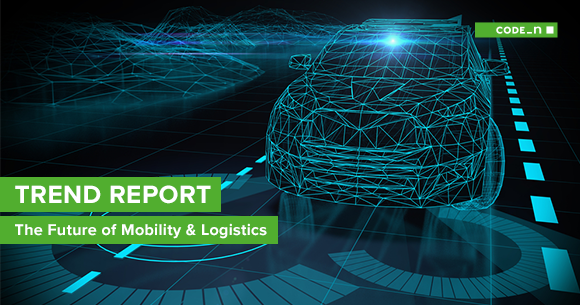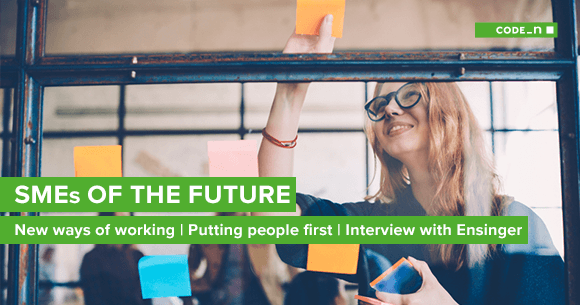Drones, autonomous driving or car sharing? What does the future of mobility and logistics really hold?
Let’s take a quick look at the year 2036: Bus stops have disappeared from the cityscape. Public transport now knows the schedule, the daily routes and the needs of every single commuter, who freely provides this information to the local transport network. Locomotion takes place by me stepping out my front door and getting into a self-driving car that knows exactly where I want to go. You don’t believe it? Numerous startups are already working on disruptive and innovative developments in the area of mobility that will make this vision a reality! The way we travel will change drastically. How will I get from point A to point B today? Will you have a car or will it have been replaced long since by an alternative? Will you dream of a self-driving vehicle or will you rather still stay in control at the wheel? And what will logistics look like? Will the nice UPS guy disappear and soon be replaced by drones delivering our packages? Mobility is a subject that affects us all and has an enormous potential for change! This is because everyone sometimes needs to get somewhere and our world is growing every more closer together – regional borders are no longer a hindrance. The transformation of this sector and thus entire industries, along with the urban planning of our cities, is in full swing. What and where do pioneering tech startups see the trends over the next few years? We asked!

Self-driving cars and car sharing promise to save our overloaded major cities from collapse. The switch to electric cars supports a way out of high CO2 pollution. Ever stricter regulations are forcing the industry to find new solutions. Tesla is putting more and more pressure on existing players with its innovations. And consumers are also changing their ways! Owning your own car is now no longer a reflection of your self-image. The times in which the car was very important as a status symbol are gone, especially for the younger generation.
Back to the year 2036. Which startups are working on the beginnings of the future vision described? Faraday Future, Anki, Bestmil – in case these names are unfamiliar to you, take a look at the “Back to the Future of Connected Mobility” talk by Bernd Gill (Head of Service Innovation) and Ulrich Pfeiffer (Director and Regional Chief Technologist) from HPE. Both provided a remarkable overview of future opportunities at the new.New Festival 2016.
The growth of the autonomous car market
This illuminating infographic from getoffroad.com also offers a unique summary of the various aspects of the growth market of autonomous vehicles. It is projected to grow to an unbelievable 29 billion in the area of semi-autonomous vehicles and 4.8 billion for completely autonomous vehicles by the year 2025! The self-driving taxi has been started in Singapore in few areas and it will be started commercially in entire Singapore by 2018. Ford CEO has announced that the fully autonomous vehicles for mobility services will be implemented by 2021. According to Volkswagen’s strategy, the autonomous car will be launched by 2019. Google’s founder has made it clear that its autonomous car will be getting down to the market in 2018.

We talked to 3 tech startups! Here are their answers
Meanwhile, over 250 disruptive startups with pioneering, digital business models took part in the global CODE_ CONTEST. This included teams that are co-developing the next mobility trends. We talked with three of our alumni and asked for their expert opinion as to where the future of mobility and logistics is going – exciting insights ahead!
The logistics startup: Transmetrics
The business model:Transmetrics offers a new approach to solving inefficient capacity utilization problem in cargo transport industry using Big Data and predictive analytics. Transmetrics developed an end-to-end solution that allows cargo companies to forecast with high accuracy their fluctuating volumes for weeks ahead, and then the predictive optimization module shows the most optimal way to run their transport network. Transmetrics solution helped logistics companies reduce their linehaul costs up to 25%.
“We believe that the hottest trends in logistics over the next few years will be autonomous vehicles, drones, and anticipatory logistics. The challenge for autonomous vehicles and drones is connected to regulations and public acceptance. However, they also bring groundbreaking opportunity for logistics – in their report, DHL claimed that autonomous driving could lower costs for freight by up to 40% per kilometer. At the same time, drones can disrupt the last-mile delivery, which accounts for approximately 30% of the total delivery cost, and which is becoming even more challenging with the growth of e-commerce. Anticipatory logistics, powered by Big Data and predictive analytics, can help in tackling the problem of low capacity utilization and significantly improve process efficiency. For instance, 24% of road freight kilometers in Europe are driven by trucks which are completely empty. When carrying cargo, on average the trucks are full to only 57% of their gross weight capacity. Using Big Data and predictive analytics, logistics companies can anticipate the demand weeks in advance and optimize their network in the most efficient way. The key challenges for this trend are associated with the data quality and with the scarcity of experienced data scientists needed for such solutions. One of the possible ways to address these challenges is finding a right solution partner who has in depth knowledge in both technological and logistics industry domains. Transmetrics is disrupting logistics through one of the trends mentioned above. We offer a Big Data predictive analytics solution for cargo transport companies that generates highly accurate demand forecasts and offers predictive network optimization. As a result, the company is able to make better, data-driven decisions, weeks in advance. The implementation of forecasting and optimization modules allows for the continuous monitoring and improvement of network performance. It helps increase network resilience, planning flexibility and prevents under-performance during peak seasons. Transmetrics’ solution has already helped companies achieve up to a 25% reduction in the linehaul costs and we are currently working with leading global logistics companies, including three companies from Fortune 500 list.”
Sensors startup #1: senvisys
The business model:senvisys offers sensor systems for various applications. The company produces its own equipment that can receive sound wave signals with the highest sensitivity as well as software that analyzes and processes these signals. This technology enables railway stations, tunnels and hazardous routes, etc. to be monitored efficiently and cost-effectively.
“We believe that railways will play an important role in the future. As a challenge in these developments, we see the security issues and the difficulties in changing established but outdated solutions. We at senvisys provide the digitalization of the rail’s vibrations. In this way, we are able to deliver the most cost-efficient and reliable solution in order to detect and monitor rail traffic. We are about to internationalize our product.”
Sensors startup #2: Toposens
The business idea: Toposens creates groundbreaking new technology for machine vision without using any optical components! The sensor follows the principles of the echolocation of a bat, which can see tiny objects by emitting ultrasound signals and receiving their reflections. The team adapted this method and developed a small sensor system based on ultrasound. The Toposens 3D sensor therefore enables machines and robots to better perceive their surroundings without the disadvantages inherent to optical systems.
“The future of mobility? We believe in car sharing and ride sharing! In our opinion, mobility will become much more a field of service than of goods. Still, national regulations are a big challenge to drive the innovation further. We at Toposens will contribute to shared vehicles that drive around autonomously. Our 3D ultrasound sensors enable autonomous driving at slow speeds, e.g. for autonomous parking or for traffic jams.”
Some interesting perspectives, don’t you think? We will continue reporting on the mobility trend! The next article will also have some exciting insider information regarding the topic of logistics. Dirk Reich, Board Member from Transmetrics, will provide some insights into his many years of industry experience in a company guest feature. Take a look, it will be well worth it!






Comments